
Francis James Child, compiler and editor of the monumental English and Scottish Popular Ballads, established the scholarly study of folk ballads in the English-speaking world. His successors at Harvard University, notably George Lyman Kittredge, Milman Parry, and Albert B. Lord, discovered new ways of relating ideas about sung narrative to the study of epic poetry and what has come to be called—though not without controversy—“oral literature.”
In this volume, sixteen distinguished scholars from Europe and the United States offer original essays in the spirit of these pioneers. The topics of their studies include well-known “Child Ballads” in their British and American forms; aspects of the oral literatures of France, Ireland, Scandinavia, medieval England, ancient Greece, and modern Egypt; and recent literary ballads and popular songs. Many of the essays evince a concern with the theoretical underpinnings of the study of folklore and literature, orality and literacy; and as a whole the volume reestablishes the European ballad in the wider context of oral literature. Among the contributors are Albert B. Lord, Bengt R. Jonsson, Gregory Nagy, David Buchan, Vesteinn Olason, and Karl Reichl.
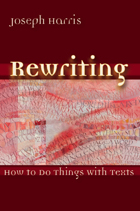
"Like all writers, intellectuals need to say something new and say it well. But unlike many other writers, what intellectuals have to say is bound up with the books we are reading . . . and the ideas of the people we are talking with."
What are the moves that an academic writer makes? How does writing as an intellectual change the way we work from sources? In Rewriting, a textbook for the undergraduate classroom, Joseph Harris draws the college writing student away from static ideas of thesis, support, and structure, and toward a more mature and dynamic understanding. Harris wants college writers to think of intellectual writing as an adaptive and social activity, and he offers them a clear set of strategies—a set of moves—for participating in it.
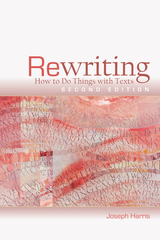
“Like all writers, intellectuals need to say something new and say it well. But for intellectuals, unlike many other writers, what we have to say is bound up with the books we are reading . . . and the ideas of the people we are talking with.”
What are the moves that an academic writer makes? How does writing as an intellectual change the way we work from sources? In Rewriting, Joseph Harris draws the college writing student away from static ideas of thesis, support, and structure, and toward a more mature and dynamic understanding. Harris wants college writers to think of intellectual writing as an adaptive and social activity, and he offers them a clear set of strategies—a set of moves—for participating in it. The second edition introduces remixing as an additional signature move and is updated with new attention to digital writing, which both extends and rethinks the ideas of earlier chapters.
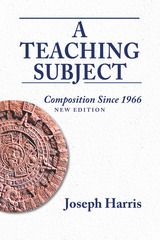
In this classic text, Joseph Harris traces the evolution of college writing instruction since the Dartmouth Seminar of 1966. A Teaching Subject offers a brilliant interpretive history of the first decades during which writing studies came to be imagined as a discipline separable from its partners in English studies. Postscripts to each chapter in this new edition bring the history of composition up to the present.
Reviewing the development of the field through five key ideas, Harris unfolds a set of issues and tensions that continue to shape the teaching of writing today. Ultimately, he builds a case, now deeply influential in its own right, that composition defines itself through its interest and investment in the literacy work that students and teachers do together. Unique among English studies fields, composition is, Harris contends, a teaching subject.
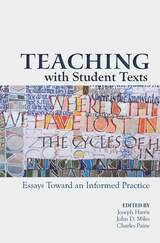
Harris, Miles and Paine ask: What happens when the texts that students write become the focus of a writing course? In response, a distinguished group of scholar/teachers suggests that teaching with students texts is not simply a classroom technique, but a way of working with writing that defines composition as a field.
In Teaching with Student Texts, authors discuss ways of revaluing student writing as intellectual work, of circulating student texts in the classroom and beyond, and of changing our classroom practices by bringing student writings to the table. Together, these essays articulate a variety of ways that student texts can take a central place in classroom work and can, in the process, redefine the ways our field talks about writing.

Bartlett Jere Whiting, a pioneer and acknowledged master of the lexicography of proverbs, also wrote three seminal articles on general and theoretical aspects of paremiology, the study of proverbs and related speech forms: “The Origin of the Proverb,” “The Nature of the Proverb,” and “The Study of Proverbs.” On the occasion of his ninetieth birthday, friends, students, and colleagues from the Harvard English Department, Whiting’s academic home for nearly fifty years, offer these essential readings to a new generation of scholars and enthusiasts of “the wisdom of many, the wit of one.”
Whiting’s essays are accompanied by an annotated bibliography of his works on the proverb by the best-known contemporary student of the subject, Wolfgang Mieder; and introductory essays by Joseph Harris and Wolfgang Mieder and by Susan E. Deskis place Whiting in the history of international proverb study.
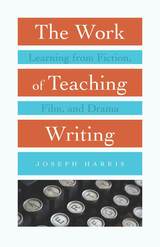
Each chapter examines a fictional representation of writing classes—Dead Poets Society, Up the Down Staircase, Educating Rita, Push, and more—and shifts the conversation from how these works portray teachers to how they dramatize the actual work of teaching. Harris considers scenes of instruction from different stages of the writing process and depictions of students and teachers at work together to highlight the everyday aspects of teaching writing.
In the writing classroom the ideas of teachers come to life in the work of their students. The Work of Teaching Writing shows what fiction, film, and drama can convey about the moment of exchange between teacher and student as they work together to create new insights into writing. It will interest both high school and undergraduate English teachers, as well as graduate students and scholars in composition and rhetoric, literary studies, and film studies.
READERS
Browse our collection.
PUBLISHERS
See BiblioVault's publisher services.
STUDENT SERVICES
Files for college accessibility offices.
UChicago Accessibility Resources
home | accessibility | search | about | contact us
BiblioVault ® 2001 - 2024
The University of Chicago Press









